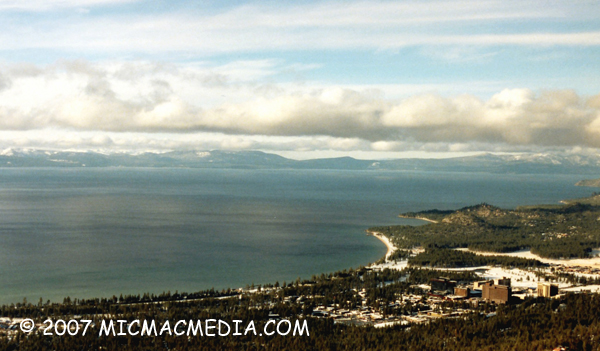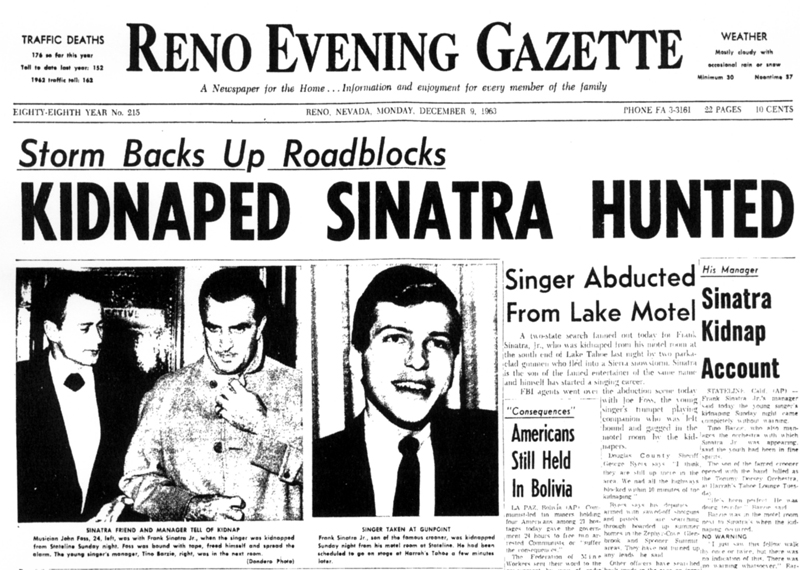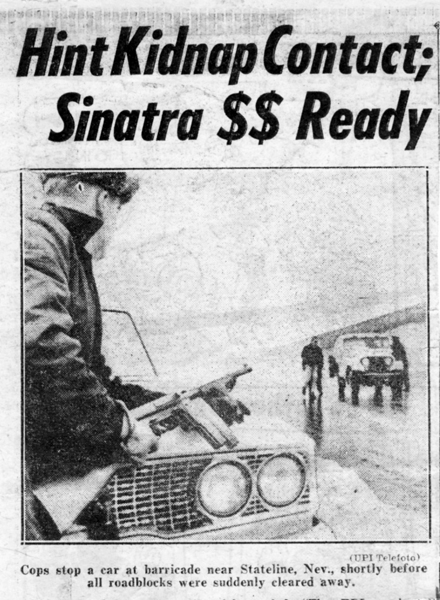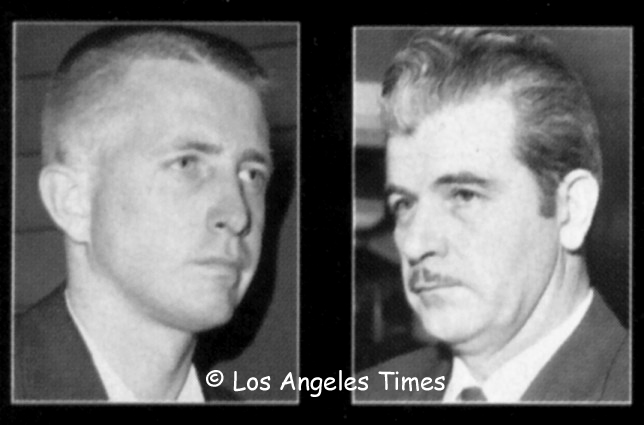 |
|
|
Follow Mark on Facebook for more stories |
||
 |
|||||
|
Tahoe Nugget #127 Sinatra, Jr. — Kidnapped! It was a dark and stormy night. In fact, a full blown blizzard was raging on the evening of December 8, 1963, when a loud knock rattled the door of Room 417 in Harrah's Lodge at South Lake Tahoe. Inside, Frank Sinatra Jr., an aspiring singer and son of the most famous crooner in the world, and John Foss, a trumpet player in the Tommy Dorsey Orchestra, were eating dinner. The time was 9:30 p.m. and the two young men were relaxing before their scheduled 10 o'clock performance that night with the Dorsey Orchestra in Harrah's Tahoe Lounge. Suddenly, two parka-clad gunmen pretending to be room service waiters barged into their room demanding money. They first bound and gagged Foss, then blindfolded the 19-year-old Sinatra, threw a blue overcoat over his shoulders and forced him out into the snowdrifts towards a white Chevrolet Impala. Before leaving one of the men ripped the telephone line from the wall and warned Foss: "Keep your trap shut for ten minutes or we'll kill your friend. If we don't make it to Sacramento, your pal is dead." Ten minutes after the kidnappers drove off into the blinding snowstorm, Foss worked free of his bonds and alerted the band's manager, Tino Barzie, in the motel room next door. They immediately called the police. Officers from the Zephyr Cove substation five miles away arrived at the motel within minutes. Since kidnapping is a federal offense, FBI agents from Reno quickly swarmed into the Tahoe Basin. Frank Sinatra, Sr. was at home in Palm Springs, California, when he received word of his son's abduction. The snowstorm had shut down the South Lake Tahoe airport so he flew to Reno where he was met by William Raggio, the district attorney of Washoe County. After a failed attempt to drive over icy, storm-swept Spooner Summit (other roads were closed), Sinatra and Raggio returned to Reno where they set up headquarters in a three-room suite at the Mapes Hotel. As the hours dragged on with no word from the kidnappers, Raggio told reporters, "The longer it goes, the worse it looks." Sinatra's press agent, Jim Mahoney, said Sinatra's nerves were a wreck: "He has just been sitting and staring at the phone. When it rings, he jumps. I had to practically force him to eat. He doesn't think about eating. He just looks at the phone." Offers of help, including airplanes, helicopters and mounted horsemen came in from all over the world. Sympathetic telephone calls were received from Attorney General Robert Kennedy in Washington, whose own brother had just been assassinated less than one month before. Kennedy promised federal help in an all-out rescue effort. Other heartfelt messages of support arrived from political figures and entertainment celebrities. One loyal fan offered $50 to help with the search. The two-state manhunt utilized nearly 100 California and Nevada sheriff deputies and 26 FBI agents. This small army had left no stone unturned in their pursuit of the perpetrators. Despite the kidnappers' remark about heading for Sacramento, police were able to trace the car's tire chain tracks through six inches of fresh snow. The abductors were heading east toward Carson City, Nevada, not west toward Donner Pass. Roadblocks were thrown up on every highway in the region, but no suspects were apprehended. Most of the FBI agents and local sheriff's deputies believed that due to the swiftness of their deployment and roadblocks, the kidnappers holding Sinatra must still be somewhere in the snowswept region. Despite their certainty, however, the criminals somehow managed to slip through the net. On Monday, December 9, Sinatra received the first of seven phone calls from his son's abductors. He was told to drive alone to a Carson City service station. Sinatra used an unwatched basement exit at the Mapes Hotel to elude reporters, jumped in a car and sped off to Ron's Gas Station, 30 miles south of Reno. The surprised attendant there sputtered, "Someone's been phoning you here. I thought it was a gag." Another call sent Sinatra to a different gas station for more details regarding the ransom and release. That night Sinatra flew to Southern California to await further instructions. Frank Sinatra, Sr. had told reporters, "I would give the world for my son." When the ransom call finally came, Sinatra offered them a million dollars if they would return his son safely. Inexplicably, the kidnappers asked for only $240,000 in unmarked bills. Sinatra called his friend Alfred Hart, President of the Citizens National City Bank in Beverly Hills, who put together the ransom package. Sinatra waited at his former wife Nancy's Bel-Air home to wait for the next contact. Reporters flocked to Bel-Air to cover the biggest kidnapping in America since the abduction of the Lindbergh baby in 1932. After several more phone calls of instruction, FBI agent Jerome Crowe left an attaché case full of money between two parked school buses in West Los Angeles. The time was 12:30 a.m. Wednesday, Dec. 11. Two hours later, Frank, Jr. was released by one of his captors and picked up by a private security officer about two miles from Nancy's home. Frank, Jr. had been held for 54 hours, much of it in the trunk of a car and all of it blindfolded. Of course his parents were elated to see him home safe and sound. When the good news swept the nation, Robert Kennedy called back to congratulate the family. Frank Sr.'s mother Dolly told reporters back in New Jersey, "I was saying the Rosary when the call came. I dropped my rosary beads and fell down in a near faint. This is the happiest moment of my life. We are leaving for California on the twentieth. We will spend Christmas together — the whole family." The next day, Dec. 12, was Frank, Senior's 48th birthday. He celebrated at his Las Vegas casino, the Sands. "Getting Frankie back is the best birthday present I could ever have," Sinatra told his friends. Less than a week later the FBI announced the capture of three suspects. FBI Director J. Edgar Hoover stated that the culprits were John Irwin, a 42-year-old housepainter, Barry Keenan and Joseph Amsler, both 23 years old and unemployed. The trio admitted to the crime and returned virtually all of the ransom money. Amsler and Keenan were sentenced to life imprisonment plus 75 years, while Irwin, who had been kind to Frank, Jr., received a 16-year sentence. Later the sentences of all three men were drastically reduced and the men paroled. Ultimately, Federal District Judge William Este decided to treat the amateur kidnappers leniently and they served only 12 years in prison between them. In August 1998, Frank Sinatra, Jr. won a court order barring Irwin, Keenan and Amsler from earning a reported $1 million from Columbia Pictures for their help with a new film about Frank Sinatra, Sr. who died in 1998. Photo #1: Looking northwest over South Lake Tahoe where Frank Sinatra, Jr. was kidnapped in 1963. Photo #2: Kidnapping made national headlines. Note spelling typo in headline. Photo #3: Local cops weren't messing around. Note automatic weapon. Roadblocks were manned on all roads leaving Tahoe Basin, but the kidnappers slipped through the dragnet. Photo #4: Two of the bad guys. Barry Keenan (left) and John Irwin.
|
|||||
|




